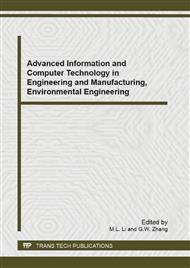[1]
D. Feng, C. Jiang, and G. Lim, A survey of energy-efficient wireless communications, IEEE Communications Surveys and Tutorials, vol. 14, no. 3, pp.1-12, (2012).
Google Scholar
[2]
D. Jiang, Z. Xu, Z. Chen, et al., Joint time-frequency sparse estimation of large-scale network traffic, Computer Networks, vol. 55, no. 10, pp.3533-3547, (2011).
DOI: 10.1016/j.comnet.2011.06.027
Google Scholar
[3]
D. Jiang, Z. Xu, L. Nie, et al., An approximate approach to end-to-end traffic in communication networks, Chinese Journal of Electronics, vol. 21, no. 4, pp.705-710, (2012).
Google Scholar
[4]
T. Chen, H. Kim, and Y. Yang, Energy efficiency metrics for green wireless communications, " in Proc. of WCSP, 10, pp, 1-6, (2010).
Google Scholar
[5]
T. Cui, L. Chen, and T. Ho, Energy efficiency opportunistic network coding for wireless networks, " in Proc. of INFOCOM, 08, pp.361-365, (2008).
Google Scholar
[6]
A. Khreishah, et al., Cross-layer optimization for wireless multihop networks with pairwise intersession network coding, IEEE Journals on Selected Areas in Communications, vol. 27, no. 5, pp.606-621, (2009).
DOI: 10.1109/jsac.2009.090604
Google Scholar
[7]
Z. Chen, D. Jiang, and Z. Xu, A multicast routing algorithm in cognitive ad hoc networks, " in: Proc. of ICCP, 10, pp.284-288, (2010).
Google Scholar
[8]
R. Ahlswede, N. Cai, S. Li, et al., Network information flow, IEEE Trans. on Information Theory, vol. 46, no. 4, pp.1204-1216, (2000).
DOI: 10.1109/18.850663
Google Scholar
[9]
S. Katti, H. S. Rahul, W. Hu, et al., XORs in the air: Practical wireless network coding, " in Proc. of SIGCOMM, 06, pp.243-254, (2006).
DOI: 10.1145/1151659.1159942
Google Scholar
[10]
L. Ding, P. Wu, H. Wang, et al., Lifetime maximization with inter-session network coding in energy constrained wireless networks, " in Proc. of VTC, 11, pp.1-5, (2011).
DOI: 10.1109/vetecs.2011.5956684
Google Scholar
[11]
S. Guo, et al., Minimum-energy multicast in wireless ad hoc networks with adaptive antennas: MILP formula- tions and heuristic algorithms, IEEE Transactions on Mobile Computing, vol. 5, no. 4 pp.333-346, (2006).
DOI: 10.1109/tmc.2006.1599403
Google Scholar
[12]
Z. Yuan, L. Wang, L. Shu, et al., A balanced energy consumption sleep scheduling algorithm in wireless sensor networks, " in Proc. of IWCMC, 11, pp.831-835, (2011).
DOI: 10.1109/iwcmc.2011.5982654
Google Scholar
[13]
J. Zhang and N. Ansari, A simple sleep control scheme based on traffic monitoring and inference for IEEE 802. 16e/m systems, " in Proc. of WCNC, 12, pp.2504-2508, (2012).
DOI: 10.1109/wcnc.2012.6214219
Google Scholar


